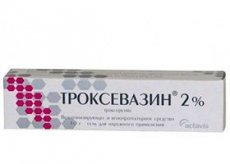Medical expert of the article
New publications
Preparations
Troxevasin gel
Last reviewed: 03.07.2025

All iLive content is medically reviewed or fact checked to ensure as much factual accuracy as possible.
We have strict sourcing guidelines and only link to reputable media sites, academic research institutions and, whenever possible, medically peer reviewed studies. Note that the numbers in parentheses ([1], [2], etc.) are clickable links to these studies.
If you feel that any of our content is inaccurate, out-of-date, or otherwise questionable, please select it and press Ctrl + Enter.

The medication Troxevasin-gel is indicated for use in cases of pain and swelling caused by injuries – bruises, sprains, etc.
Indications Troxevasin gel
The medicine Troxevasin-gel is indicated for use in case of pain and swelling caused by injuries - bruises, sprains, etc. The medicine is also used for varicose dermatitis, periphlebitis, thrombophlebitis, varicose veins, cramps and paresthesia. The drug is necessary for chronic venous insufficiency, which is characterized by heaviness in the legs, engorgement and fatigue of the legs, as well as the appearance of spider veins and spider veins.
Release form
It is produced in the form of a gel from yellowish to light brown, intended for external use. The drug is packaged in aluminum tubes, which have an internal varnish coating. Each tube is closed with an aluminum membrane. In some cases, the drug is released in a laminated plastic tube equipped with an aluminum membrane. The tube is placed in a cardboard package and is accompanied by a leaflet with instructions. Each one gram of Troxevasin-gel contains twenty milligrams of the active substance - troxerutin. The drug also has a certain content of excipients - carmbomer, trolamine, disodium edetate, benzalkonium chloride, purified water.
Pharmacodynamics
Troxevasin gel is a flavonoid - a derivative of rutin. It has vitamin activity of vitamin P, which leads to venotonic, venoprotective, anti-edematous, anti-inflammatory, anticoagulant and antioxidant effects. It helps reduce the fragility and permeability of capillaries, which leads to an increase in their tone. It leads to an increase in the wall of blood vessels, affects the exudation of fluid in the plasma towards its decrease. It leads to a decrease in inflammatory processes in the walls of blood vessels by limiting the adhesion of platelets to their surfaces.
Pharmacokinetics
Local use of Troxevasin gel promotes rapid penetration of the active component through the epidermis. After half an hour, the substance is observed in the dermis, and within two to five hours it enters the subcutaneous fat.
Dosing and administration
Troxevasin gel is intended for external use. The gel should be applied to the desired area of skin twice a day, in the morning and evening, using gentle rubbing until the drug is absorbed into the skin. If necessary, bandages or other protective dressings can be applied over the gel. The course of treatment with the drug is individual and is determined in each specific case by specialists.
 [ 5 ]
[ 5 ]
Use Troxevasin gel during pregnancy
There is no data regarding the negative impact of Troxevasin gel on the fetus during pregnancy and the child during the lactation period.
Side effects Troxevasin gel
- The drug is well tolerated by patients.
- Sometimes local skin reactions are observed in the form of an allergy to the drug, which are accompanied by the appearance of eczema, urticaria, and dermatitis.
 [ 4 ]
[ 4 ]
Overdose
Interactions with other drugs
At present, there is a lack of data on the interaction of the drug with other medications.
Shelf life
Troxevasin gel is stored in aluminum tubes for 5 years, in plastic tubes for 2 years from the date of production.
Attention!
To simplify the perception of information, this instruction for use of the drug "Troxevasin gel" translated and presented in a special form on the basis of the official instructions for medical use of the drug. Before use read the annotation that came directly to medicines.
Description provided for informational purposes and is not a guide to self-healing. The need for this drug, the purpose of the treatment regimen, methods and dose of the drug is determined solely by the attending physician. Self-medication is dangerous for your health.

